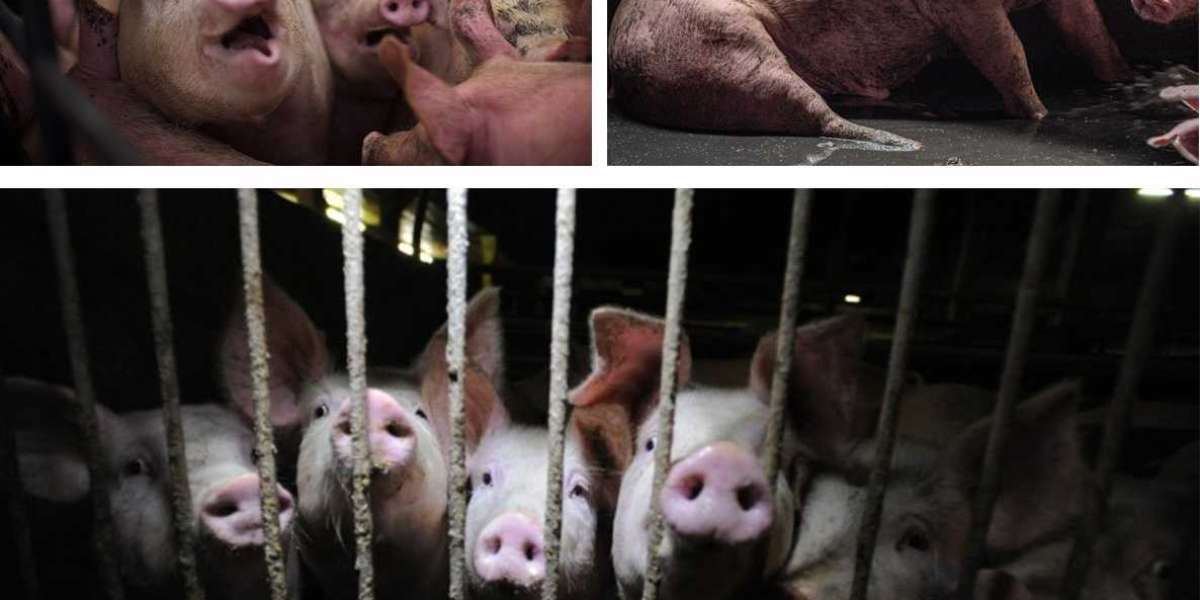Pig farming cruelty, also known as piggery, is a significant part of the global agricultural sector. It provides a source of meat and income for millions of people. However, beneath the economic benefits lies a disturbing reality of cruelty and inhumane treatment that often characterizes the pig farming industry. This article explores the various facets of cruelty in pig farming, shedding light on the suffering endured by these intelligent and social animals.
1. Confinement and Space Restriction
One of the most pervasive forms of cruelty in pig farming is the extreme confinement of pigs. In many industrial pig farms, sows (female pigs) are kept in gestation crates for most of their lives. These crates are so small that the sows cannot turn around or lie down comfortably. The lack of movement leads to severe physical and psychological distress. These intelligent animals are denied the ability to express natural behaviors, leading to frustration and suffering.
2. Mutilations Without Anesthesia
Another widespread practice in pig farming is the mutilation of piglets without the use of anesthesia or pain relief. Tail docking, teeth clipping, and castration are routine procedures aimed at preventing injuries and aggression among pigs. However, these procedures cause immense pain and stress to the animals. Tail docking, for instance, involves cutting off a portion of the piglet’s tail to prevent tail-biting behavior, which is a result of the stressful and overcrowded living conditions.
3. Overcrowding and Unsanitary Conditions
Pig farming cruelty in factory farms are often housed in overcrowded and unsanitary conditions. These conditions lead to a host of health problems, including respiratory issues, infections, and injuries. The ammonia from the accumulation of urine and feces can cause severe respiratory problems, both for the pigs and the farm workers. Overcrowding also leads to increased aggression and cannibalistic behaviors among pigs, further exacerbating their suffering.
4. Transport and Slaughter
The cruelty extends beyond the farm to the transport and slaughter processes. Pigs are often transported long distances in cramped trucks, exposed to extreme temperatures and without adequate food or water. Many pigs die from heat stress, cold, or dehydration during transport. Upon reaching the slaughterhouse, pigs are often handled roughly, leading to injuries and stress. The slaughter process itself is supposed to be regulated to ensure a humane death, but violations are common. Instances of pigs being improperly stunned and thus conscious during the slaughter process are disturbingly frequent.
5. Psychological Distress
Pigs are highly intelligent and social animals, capable of forming complex social relationships and experiencing a range of emotions. The conditions in industrial farms deprive them of mental stimulation and social interaction, leading to psychological distress. Behaviors such as repetitive biting of bars, head weaving, and excessive chewing are indicators of mental suffering. The lack of enrichment and social interaction takes a severe toll on the well-being of these animals.
6. Antibiotic Overuse
To combat the diseases that arise from overcrowded and unsanitary conditions, many pig farms rely heavily on antibiotics. This overuse of antibiotics not only affects the health of the pigs but also poses a significant risk to human health by contributing to the rise of antibiotic-resistant bacteria. The routine administration of antibiotics masks the underlying issues of poor animal welfare and perpetuates the cycle of cruelty.
7. Environmental Impact
The environmental impact of pig farming is another dimension of its cruelty. The vast amounts of waste produced by large pig farms can contaminate water supplies, leading to harmful effects on local communities and ecosystems. The pollution from pig farms can cause respiratory problems, skin issues, and other health concerns for nearby residents. The environmental degradation resulting from pig farming underscores the interconnectedness of animal welfare and environmental health.
8. Legal and Ethical Considerations
While there are laws and regulations intended to protect farm animals, enforcement is often weak, and many practices that cause significant suffering are still legal. The agricultural industry wields considerable influence, often hindering efforts to improve animal welfare standards. Ethical considerations demand a re-evaluation of how society treats pigs and other farm animals. The sentience and capacity for suffering of pigs necessitate a shift towards more humane and compassionate farming practices.
9. Alternatives to Conventional Pig Farming
There are alternatives to conventional pig farming that prioritize animal welfare and environmental sustainability. Pasture-raised and free-range systems allow pigs to engage in natural behaviors, resulting in better physical and psychological health. Additionally, advancements in plant-based and cultured meat technologies offer promising solutions to reduce the reliance on animal farming altogether. Supporting these alternatives can help drive change in the industry and reduce the cruelty associated with pig farming.
10. Consumer Awareness and Advocacy
Consumers play a crucial role in addressing the cruelty of pig farming. By becoming informed about the conditions in which pigs are raised and choosing to support higher welfare products, consumers can drive demand for more humane farming practices. Advocacy and activism are also essential in pushing for legislative changes and increased enforcement of animal welfare standards. Organizations dedicated to animal rights work tirelessly to raise awareness and promote policies that protect farm animals.
Conclusion
The cruelty inherent in pig farming is a pressing issue that demands attention and action. The physical and psychological suffering endured by pigs in industrial farming systems is a stark reminder of the ethical responsibilities humans have towards animals. By supporting more humane farming practices, advocating for stronger animal welfare laws, and exploring alternatives to animal products, society can move towards a future where the cruelty of pig farming is a thing of the past. It is incumbent upon each of us to make informed choices and advocate for the compassionate treatment of all animals.






